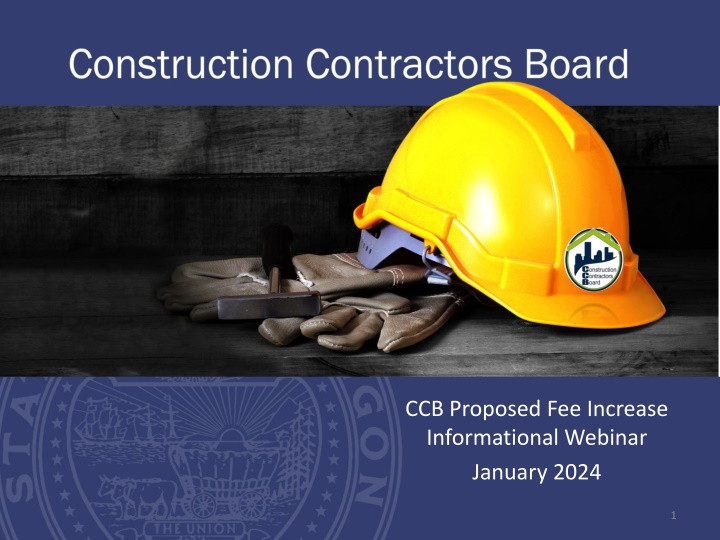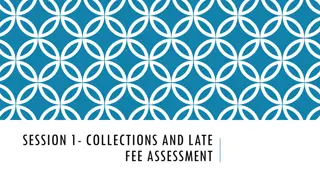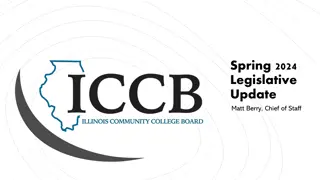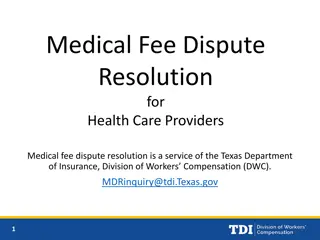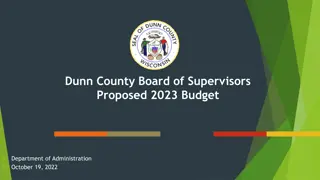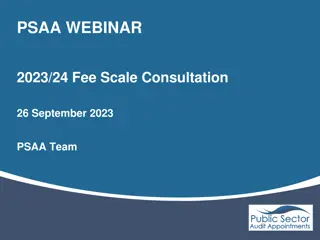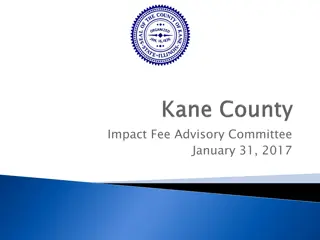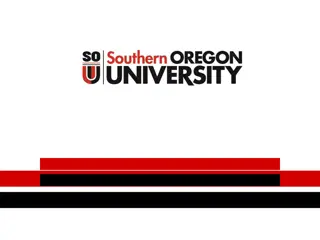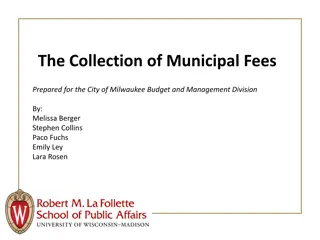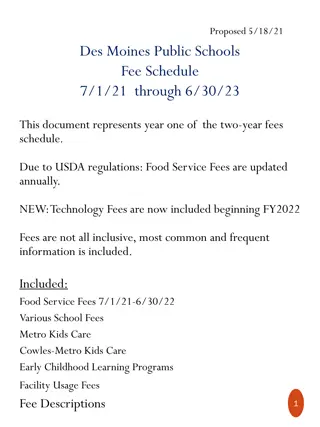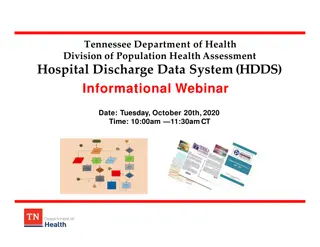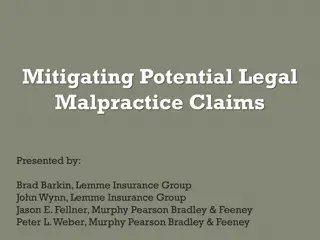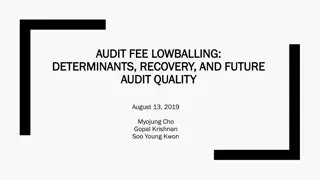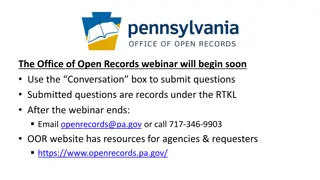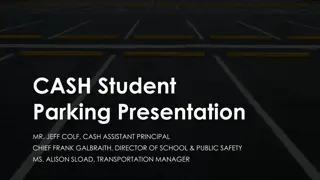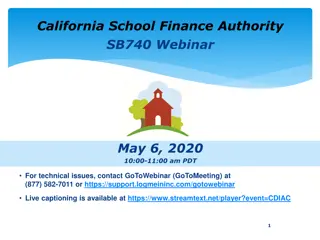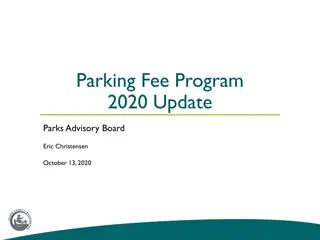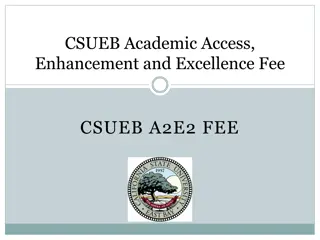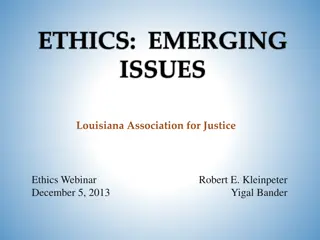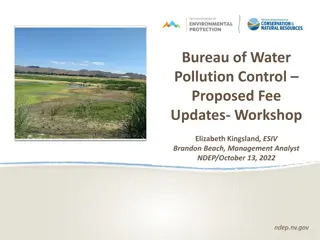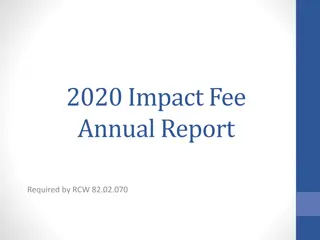Proposed Fee Increase Informational Webinar Overview
Learn about the Proposed Fee Increase Informational Webinar held by the CCB featuring key topics such as the reasons behind the fee increase, breakdown of CCB funding sources, agency structure, public comment opportunities, and more. Presenter: Chris Huntington, CCB Administrator.
Uploaded on Sep 22, 2024 | 1 Views
Download Presentation

Please find below an Image/Link to download the presentation.
The content on the website is provided AS IS for your information and personal use only. It may not be sold, licensed, or shared on other websites without obtaining consent from the author.If you encounter any issues during the download, it is possible that the publisher has removed the file from their server.
You are allowed to download the files provided on this website for personal or commercial use, subject to the condition that they are used lawfully. All files are the property of their respective owners.
The content on the website is provided AS IS for your information and personal use only. It may not be sold, licensed, or shared on other websites without obtaining consent from the author.
E N D
Presentation Transcript
CCB Proposed Fee Increase Informational Webinar January 2024 1
Technical Issues If you encounter technical Difficulties? No sound? Click on the audio tab; Then click no audio; Then click computer audio. No video? Leave the webinar and re-enter. If you would like to ask a question Enter it in the Questions tab. We will respond to questions at the end of the presentation. 2
Welcome CCB Informational Webinar Proposed Fee Increase Presenter: Chris Huntington, CCB Administrator Informational Webinar not collecting public comment Opportunities to provide public comment Public Comment period is open until March 14th 5:00 p.m. Please submit email public comment to: Shannon.flowers@ccb.Oregon.gov Mail Comments to: P.O. Box 14140 Salem, OR 97309-5052 Public Hearing March 13th 2:00 p.m. CCB First Floor Hearing Room 201 High Street SE, Salem, Oregon 3
Overview Key Questions we will address: How are contractor fees used? Overview of Agency and Funding and Program structure What has been proposed? $75 fee increase implemented over two years beginning July 1, 2024 Total fee of $400 Why does the board believe an increase is needed? Factors driving the conversation and the board s priorities Current revenue cannot support existing service levels Were alternatives considered? Additional reductions in staffing and service delivery Defer modernization efforts Brass Tacks: Board determined that the increase was necessary to maintain adequate service levels and support modernization efforts. 4
CCB Funding Overview CCB Revenue Breakdown Contractor Licensing fees: 87% Civil penalties: 11% 80% of civil penalties transfer to state General Fund. Miscellaneous income: 2% Filing fees, change fees, admin and processing fees etc. CCB is a Fee-for-Service Agency Revenue/fees drive service delivery. CCB actively monitors and adjusts staffing, hiring service delivery based on actual and projected economic activity. We always look at ways to first adjust service, be more efficient, add tools to do-more-with-less first 5
Agency Structure Board Staff Customers Nine-member board: Dylan Boschler, Commercial Rosa Martinez, Commercial Abel Carbajal, Residential Brent Landels, Public Member Vacant, Public Member *Nate Gerding, Commercial (Pending Senate Confirmation) Eric Olsen, Residential Deb Flagan, Residential Sean VanGordon, Local Gov. 59 permanent staff providing license, enforcement, education and dispute resolution services. Support approximately 50,000 licensees. Consumer Protection for ALL Oregon consumers. 6
Program Overview Licensing 19 Staff (32% of staffing based on FTE) Process & screening new applications (350-400 monthly) Renew existing licensees (1,300 2,000 monthly) Update insurance and bonds (1,500 2,000 monthly) Customer Call center (350-500 calls daily) 75% Positive customer service satisfaction rating Improve service delivery to be more efficient Email Reminders: more efficient, less cost Online surveys: better response, real-time data Call Center Call-back feature better service; more efficient Coming soon Online application portal faster processing 7
Program Overview Field Investigation & Compliance 16.5 staff (28% of staffing based on FTE) Identifying, investigating and stopping unlicensed work Field investigators: 8K annual jobsite checks Compliance officers: Consumer recovery and compliance CCB s enforcement program is Proactive in the field daily trying to find unlicensed work Statewide investigators across the state Responsive reports followed up on in 24-48 hours Efficient around 34 days to resolve cases Partnering to be more efficient: Agreement for BCD license checks maximize resources Expanding tools to address illegal online advertising Cross-training field investigators to conduct mediations 8
Program Overview Dispute Resolution 7.5 FTE (13% of staffing based on FTE) Mediate disputes between homeowners and contractors Voluntary program Alternative to costly and time-consuming court process Mediate approximately 1,000 disputes each year Pre-complaint mediation at contractor request 70% success rate if both parties participate Evolving Workforce to operate more efficiently Cross-training staff to move process along more quickly Moving to electronic communications 9
Program Overview Consumer & Contractor Education 4 Staff (7% of staffing based on FTE) Educate consumers about hiring licensed contractor, legal protections, best practices and avoiding scams 25-point increase in public awareness 78% Deliver contractor training on legal requirements, law changes and resources available for contractors Expanded information and resources available in Spanish for both consumers and contractors Partnerships: Key to delivering valuable resources & information Avoiding disaster scams (DOJ, DFR and CCB) Provide contractors a full regulatory picture (OSHA, DEQ, DFR) Work with industry partners to share information for contractors 10
Program Overview Administration and Central Services Administration 4 Staff (7% of Staffing by FTE) Directs agency consistent with mission, values and strategic priorities Establishes and administers consistent policy through rulemaking Coordinates human resource services for the agency Processes public records requests and other state requirements Business Services 4 Staff (7% of Staffing by FTE) Budget development and execution; ongoing revenue analysis and projections Procurement, contract administration, cashiering, mail etc. Information Technology 4 Staff (7% of staffing by FTE) Maintain and modernize IT infrastructure Develop functionality that supports efficient service delivery 11
Fee-for-Service: Impact How fees/revenue relate to service delivery Licensing Processing time for license applications, renewals, license updates Call center wait times delayed service on pending issues Field Investigations and compliance Less field presence and fewer construction sites visited Longer response time on reports of unlicensed work Dispute resolution Complaint processing delays prolongs dispute for consumer and contractor Maybe court becomes a more desirable path Education Less consumer knowledge of importance of using licensed contractor Information Technology Inability to invest in modernizing service Prevents better, more efficient services 12
What is Proposed? $75 Increase to Contractor License Fee Current Fee -- $325 (Established in 2010) New fee: $400 for a two-year license Implementation Timeline Renewals -- Beginning July 2024 June 2026 New Applications Beginning July 2025 Current Proposal was selected Provided support for existing service levels Solidified the agency s capability to modernize aging systems Replace aging license system with a modern solution Current system built in 1990 Provide better services and more efficient delivery 13
Why Raise Fees? Key Factors that board considered: Costs Increases: Labor cost inflation is up more than revenue Since 2010 Labor costs are up 55% Upshot: $1.9M projected budget deficit Workload Demand: Industry has increased Since 2010 14% increase in the number of licensees Since 2013 32% increase in number of licensees 2013 agency staffing was adjusted downward after impact of 2008 financial crisis Service levels have declined: Agency has not grown at all 2010: 1 staff member to 550 contractors 2024: 1 staff member to 847 contractors 14
Why Raise Fees? Board s Critical Priorities: Ensure Financial Continuity and Stability Address current structural budget deficit -- $1.9M Maintain existing service levels Support IT modernization by replacing agency s aging license system (1990) 15
Alternatives? Alternatives Weighed Against Board s Critical Priorities Address current structural budget deficit -- $1.9M Cuts: Staffing would need to be reduced by an additional 10 positions Result would be 1 staff member to 1,020 contractors Maintain existing service levels Cuts: Additional cuts would further reduce service, responsiveness and effectiveness 2010: 1 staff member to 550 contractors 2024: 1 staff member to 847 contractors Support IT modernization by replacing agency s aging license system (1990) Delaying IT modernization: Risks critical failure Holds agency back from providing better services more efficiently 16
Summary Fees/revenue drive service delivery. Current revenue will not support existing service levels. Contractor fees have not been adjusted upward since 2010. Agency regularly adjusts to hold costs and maintain service. Agency faces critical priories of addressing cost increases, maintaining services and investing in IT modernization. Brass Tacks: Board determined that the increase was necessary to maintain adequate services and support modernization efforts. 17
Public Comment Opportunities to provide public comment Public Comment period is open until March 14th 5:00 p.m. Please submit email public comment to: Shannon.flowers@ccb.Oregon.gov Mail Comments to: P.O. Box 14140 Salem, OR 97309-5052 Public Hearing March 13th 2:00 p.m. CCB Hearing Room 201 High Street SE, Salem, Oregon 18
